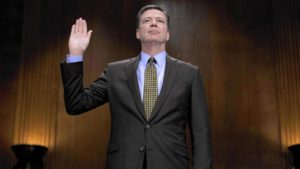Commentary: Comey testimony key to protecting U.S. elections

By Raja Krishnamoorthi
June 6, 2017, 4:35 PM
The Senate Intelligence Committee is scheduled to hear public testimony Thursday from former FBI Director James Comey, among others. Many people may be wondering why this is necessary or important, since the Justice Department has appointed a special counsel to investigate Russian interference in last November’s elections and the possible involvement of members of the Trump campaign. The short answer is that the Senate hearing will help Congress fulfill its constitutional responsibilities by exploring issues separate and apart from the special counsel’s investigation.
The special counsel, former FBI Director Robert Mueller, and his staff are primarily interested in determining whether any laws were broken during the presidential campaign or in the early months of the Trump administration — including the recent firing of Comey. Mueller will be looking at potential conflicts of interest, such as former national security adviser Michael Flynn’s reported payments by foreign sources, and whether the firing of Comey during an ongoing FBI investigation constitutes obstruction of justice.
The Senate Intelligence Committee, while delving into some of these same areas, has a different responsibility — to determine what happened in the past election and to ensure that it doesn’t happen again. Its goal should be to establish the methods by which the Russian government and its operatives sought to influence the election’s outcome; determine who among the Trump campaign, transition and White House staffs had contact with them and whether they were compensated; and to recommend changes in our laws and policies to provide future safeguards against foreign intervention in our elections.
Just this week, we have learned that Russian military intelligence executed a cyberattack on at least one U.S. voting software supplier and sent spear-phishing emails to more than 100 local election officials just days before November’s presidential election. And my colleague, Rep. Mike Quigley, D-Ill., a member of the House Intelligence Committee, told the Chicago Tribune on Monday that Russian operatives hacked the Illinois State Board of Elections last year to view database files — a move possibly designed to make voters distrust the state and federal election system.
The security and sovereignty of our elections is fundamental to our democracy and voters’ confidence in their government. Congress has a responsibility to ensure that our elections remain free from foreign interference or other efforts to undermine our democratic progress. I am hopeful that Comey’s testimony on Thursday will help move us down the path to that goal.
The questions hanging over the election and its aftermath are not partisan or political; they go directly to matters of national security. Were secrets shared with foreign governments or their operatives that compromised our security and the identities of our intelligence sources? Were national policies, such as economic sanctions, bargained away in return for foreign interference in our electoral process? Did foreign governments or their operatives utilize the internet and social media to spread “fake news” to affect voters and influence the outcome of our election? All of these are important questions that Congress must address.
It is important to note the bipartisan nature of this undertaking. The Republican and Democratic leaders of the Senate intel committee, Sens. Richard Burr, R-N.C., and Mark Warner, D-Va., have been working closely together. No matter where voters or their representatives may fall on the political spectrum, no one can countenance foreign attempts to influence the outcome of our elections, which are the foundation on which our democracy rests.
Raja Krishnamoorthi represents the 8th Congressional District of Illinois. A Democrat, he is a member of the House Oversight and Government Reform Committee.
